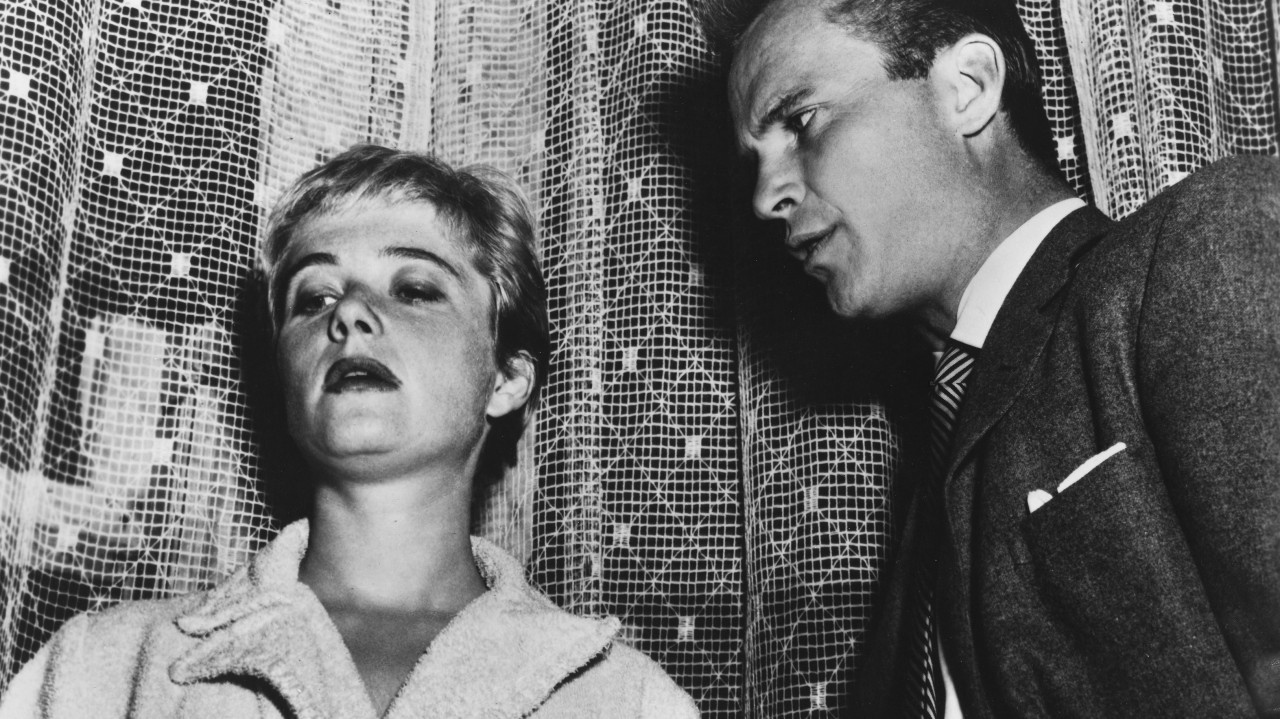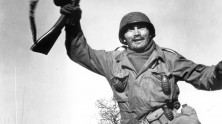
…All the Marbles
(The Complete Robert Aldrich)
When pondering the giants of American cinema, rough-and-ready journeyman Robert Aldrich may not spring intuitively to mind—if he does at all. But when glancing over his resume, which spanned just about all the movie genres that have been named (and some that haven’t) and featured appearances by the lion’s share of the 20th century’s most gifted stars, the instinct of omission starts to feel like a grave error. A persevering nonconformist and a strident leftist who began work in the classical studio era, weathered the New Hollywood craze, and flourished artistically into the late seventies, Aldrich’s weapon in the industry was his dexterity. He adapted to changing studio expectations, different storytelling contexts, and the wildly varying temperaments of collaborators without ever soiling his indomitable conscience—a virtue in any profession, but especially in one where survival typically requires flexibility at some level.
Born into wealth in Rhode Island with distinguished family ties including Nelson Rockefeller (“He went out the door the day of Attica,” went Aldrich’s terse dismissal of his politics), the future director nonetheless made an honest effort to resist the fruits of privilege, electing instead to drop out of private university and navigate Hollywood from the bottom rung. Several years as a production clerk at RKO Studios in the early forties segued into invaluable apprenticeships with legends like Charlie Chaplin, William Wellman, Jean Renoir and Lewis Milestone, as well as up-and-coming writers and directors of liberal persuasion such as Joseph Losey, Robert Rossen and Abraham Polonsky. It was in the company of the latter group that Aldrich found his scene, and when actor John Garfield formed the independent-minded Enterprise Studios in 1946, which offered refuge for the aforementioned talents and went on to produce some of the most socially conscious genre work of the decade (films such as Andre De Toth’s Ramrod, Robert Rossen’s Body and Soul, and Max Ophüls’ Caught), Aldrich was happy to take up employment. “I think anybody with any brains in 1936 to ’40 would have been a Communist,” Aldrich would speculate in Eugene L. Miller Jr. and Edwin T. Arnold’s volume of interviews, seemingly with his model Enterprise coworkers in mind.
When Enterprise went the way of the axe because of one too many commercial failures (a fate that Aldrich would surely brace for time and again as his career wore on), Aldrich decamped to New York to break into directing via the still-tenuous arena of television. It was there, on shows such as China Smith (1952) and The Doctor (1952-1953), that he proved his mettle, consequently giving former superiors the confidence to test his chops in the feature business. And though Aldrich’s debut, the MLB training camp featurette Big Leaguer, hardly screams the Aldrich Formula as it would come to be understood—it is short, sweet, and showcases a system in genuine working order—it did flash enough directorial brio (a lengthy lateral dolly shot scanning a crowded dormitory of players, for instance) to merit further work.
In many ways, Aldrich came out of the gate with a will to impress and a sensibility largely formed. In the first three years of his career alone, he directed Apache, one of the first Hollywood Westerns to center on a Native American protagonist (despite a bronzed Burt Lancaster playing him) and treat the subject of the white man’s colonization of the West bluntly; Vera Cruz, a financially triumphant vehicle for Lancaster and Gary Cooper; Kiss Me Deadly, a cause célèbre for the tough-to-please Cahiers du Cinéma clique and a sly retooling of the film noir genre; and The Big Knife, a scalpel sunk deep into the charade of a movie industry founded on duplicity and authoritarianism. These were films that aimed to make a mark, upturning expectations for the genres in which they worked and casting a view of society as inherently broken, a wall against which principled men must relentlessly push. They laid down the archetype that would course through Aldrich’s entire body of work. In his words, “It’s the same character in a number of pictures that keeps reappearing…a heroic figure, who understands that the probabilities are that he’ll lose.”
Being an avid football buff, he cast his leading men like a coach curating a championship squad, seemingly always on the hunt for the brawniest physique and most indefatigable persona. Thus, his filmography is studded with cantankerous tough guys—gruff Lancaster, square-jawed Jack Palance, smugly attractive Burt Reynolds, coarse-throated Lee Marvin, and chiseled Kirk Douglas—with whom he often endured personal quibbles and eventual fallouts. Others hung around long enough in auxiliary roles to become Aldrich staples, such as Eddie Albert, who could be relied on for slimy villainy whenever the script vaguely called for it, or Wesley Addy, usually a rare beacon of dignity hovering on the periphery of a corrupt world. Aldrich kept close his technical colleagues too, such as cinematographer Joseph Biroc, editor Michael Luciano and composer Frank De Vol (“you say five words and they know what you mean,” he enthused). Carrying on the torch of the utopian Enterprise Studios, he held a belief in the idea of the director, as opposed to the studio heads, wrangling kindred spirits around a production, a conviction substantiated by his two terms serving as president of the Directors Guild of America.
In fact, Kiss Me Deadly’s success even launched the founding of the independent venture The Associates and Aldrich, the first in a series of enterprising moves on Aldrich’s part to wield autonomy within Hollywood. At least for a stint, the gamble paid off: the three films produced under the moniker—the emotionally raw Joan Crawford-Cliff Robertson melodrama Autumn Leaves, the enraged antiwar chamber piece Attack!, and The Big Knife—all secured honors in either Venice or Berlin. Alas, this period of fecundity channeled right into Aldrich’s most bitter taste of bureaucratic meddling when Columbia Studios’ head Harry Cohn fired the director in the final stages of production on The Garment Jungle and subsequently expunged his credit. The film, a sort of On the Waterfront for the New York sweatshop set, was Aldrich’s last in the United States for half a decade; he was labeled a persona non grata in Hollywood until 1962, ironically for reasons unrelated to his political leanings.
Such hurdles miraculously never deterred Aldrich’s working life. “You should be able to do three pictures every two years, and do them well,” he argued. “It’s not only economic, but it’s philosophical.” From the early sixties through the end of his career in 1981, he cultivated a trend of directing handfuls of box office flops and following them up with career-saving critical and commercial triumphs—films like the neo-Gothic What Ever Happened to Baby Jane?, the hyper-macho and ultraviolent The Dirty Dozen and the underdog football comedy The Longest Yard. These works have national name recognition, and the latter two in particular cemented the director’s popular reputation as a down-and-dirty action director with a keen understanding of alpha-male swagger. But even a cursory scan of Aldrich’s credits reveals these kinds of films as hardly the dominating majority. Filling out his oeuvre are detective yarns (World for Ransom), psychological Westerns (The Last Sunset, Ulzana’s Raid), survivalist dramas (The Flight of the Phoenix), geopolitical procedurals (Twilight’s Last Gleaming), inside-Hollywood horrorshows (The Legend of Lylah Clare),period dramas (Emperor of the North, The Grissom Gang), cop films (The Choirboys, Hustle), and even a matinee idol romp (4 for Texas) and a female boxing movie (…All the Marbles).
One would suspect that such variety would make it difficult to discern governing creative threads, but in fact Aldrich could never hide his hand—some would say to his detriment. No matter the project, the director would bring a brute mise-en-scène and a penchant for ushering his actors toward emotional extremes, even when tackling scripts that may have called for more directorial delicacy. Aldrich’s visual style balanced cerebral detachment and assertive sensuality: deep-focus master shots with imprisoning prop arrangements and exacting lighting schemes spoke to his cognizance of the larger forces that govern individual lives, while screen-filling close-ups of heroes in states of dejection or agony (Aldrich arguably imported traces of Ingmar Bergman’s facial severity to Hollywood cinema) offered a humanizing tension. “In Aldrich's films, it is not unusual to encounter a new idea with each shot,” Francois Truffaut famously wrote in his characteristically histrionic appraisal of Kiss Me Deadly, a declaration that may have rung even truer for genuinely shape-shifting late-career peculiarities like The Choirboys, Hustle and The Legend of Lylah Clare, box office failures that hardly lack for what Manny Farber, in his seminal essay “Underground Films,” referred to as Aldrich’s “overflow of vitality.”
Aldrich died in Los Angeles in 1983, leaving behind a trail of righteous indignation at societal wrongs and needless suppression. His final film, …All the Marbles, skewered the Reagan administration’s regressive economic policies just as The Longest Yard not so subtly railed against Nixon’s neglect of the dispossessed. In 1968, Aldrich took the MPAA to court for their absurd rationale in smacking the lesbian drama The Killing of Sister George with a prohibitive X rating, and he later denounced author Joseph Wambaugh’s decision to remove his name from the credits of The Choirboys. As is repeatedly evident in his films, Aldrich reserved his greatest contempt for anyone who betrayed individual values in favor of complacently participating in a rigged system of power. And what made his work so powerful was its recognition of the fact that although defeat in such a system was likely, honest resistance remained paramount. “Struggle, Charlie, you may still win a blessing,” says a character to the despondent protagonist of The Big Knife, to which Aldrich added, “I think it’s the manner in which you struggle that entitles you to that blessing…if there is a blessing.” – Carson Lund














































